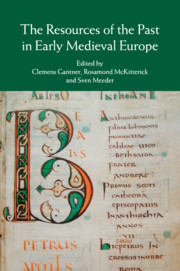‘This coherent collection focuses on the collection, formation, and management of the distant (classical and patristic) and the more recent past through processes of selective transmission, suppression, and rewriting of this heritage in the early Middle Ages. They are an important contribution to our understanding of the importance of biblical and patristic texts and the core significance of the Eusebius-Jerome tradition to create useful cultural memories, but also the malleability of these texts at the hands of authors and compilers.’
Patrick J. Geary - Institute for Advanced Study, Princeton
‘This wide-ranging collection of essays is an important contribution by medievalists to the conceptual debates about cultural and collective memory more commonly conducted with reference to later centuries. It will be of great value to all those interested in text history as well as historical writing in the early Middle Ages.’
Julia Smith - University of Glasgow
‘As ample a subject as ‘the resources of the past’ spanning the fourth century to the eleventh is appropriately given a team-treatment in this timely and stimulating volume. The authors, ranging from doctoral students to some senior figures in the field, bring richly varied resources of their own to bear. They tackle many texts, ranging from fairly obscure to much-studied, finding and testing new approaches. The effect is one of illumination across the earlier medieval period.’
Jinty Nelson - King’s College London
‘This book gives us an exciting and creative rereading of the issues involved in how to use the concept of cultural memory in actual historical analysis. It will be a new starting-point for medieval debate.’
Chris Wickham - University of Oxford
‘The natural complement to Hen and Innes’ volume The Uses of the Past in the Early Middle Ages (Cambridge, 2000), The Resources of the Past in Early Medieval Europe focuses more tightly on which, whether, and why, quarries of past knowledge were used, and how this knowledge was transformed in the process of its appropriation and transmission. Moving from inference to implication, the collection’s contributors demonstrate that such transformations were not the accidents of mindless copyists stolidly passing along an unbidden bequest, but the product of deliberate, considered choices about the past made for present and future needs. [This book] forcefully reminds us that to view a profile of Carolingian culture we must simultaneously see it as Janus-faced and take it at face value.’
Courtney M. Booker - University of British Columbia
'This innovative and stimulating volume offers a remarkable synthesis of the research directions pursued by its senior contributors over the last two decades. Yet most importantly, this volume demonstrates how a careful study of minor texts and their manuscript transmission can contribute to the social and political history of the early medieval west by diving deeper into Carolingian cultural practices.'
Warren Pezé
Source: Early Medieval Europe
'Over the course of four thematic sections (‘Learning Empire’, ‘The Biblical Past’, ‘Changing Senses of the Other from the Fourth to the Eleventh Century’ and ‘The Migration of Cultural Traditions in Early Medieval Europe’), the fifteen essays in this collection provide case studies of the ways in which early medieval authors drew upon the textual resources of the past to inform the present.'
Scott G. Bruce
Source: The Journal of Ecclesiastical History





